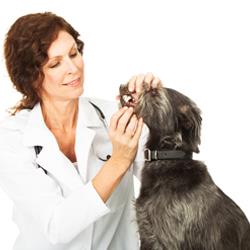Specialized Dentistry for Pets

As dental care turns into more of a routine offering at veterinary clinics, new approaches in specialized dental treatments are becoming increasingly utilized for animals in need.
Veterinary dentists are able to offer their patients more than just routine cleanings and pulling teeth. Specialized dentistry programs have created opportunities for veterinarians to become trained in advanced care and dental technology, much like what is available for human dental needs.
When training is completed, veterinary dental specialists are certified to offer the following types of professional services:
Specialized Veterinary Dentistry: Periodontics
Training focuses on treating periodontal disease, the most common clinical dental condition found when examining household pets such as cats and dogs.
Specialists are trained to complete the following:
- Oral examination
- Dental cleaning
- Dental scaling and polishing
- Dental radiograph, reading, and completion of diagnosis
- Gum surgery
- Root planing/curettage
- Advanced periodontal surgeries, including bone regeneration procedures.
Specialized Veterinary Dentistry: Endodontics
Specialists are trained to provide treatment therapies that involve the tooth, which includes the pulp of the tooth, its nerves, and blood vessels.
Endodontic treatments may involve:
- Dental issues, including:
- Worn or abraded teeth
- Abscesses
- Fractured teeth
- Loose and lost teeth
- Therapeutic procedures, involving:
- Standard root canal
- Surgical root canal
- Direct pulp capping
- Indirect pulp capping
- Apexification.
Specialized Veterinary Dentistry: Orthodontics
This type of training provides therapies that focus on correcting dental and skeletal malocclusions.
Completed through the use of surgery and orthodontic appliances, specialists are trained to identify and evaluate the following:
- Causes of misaligned teeth
- Facial symmetry repair
- Classes of occlusion
- Angle of temporomandibular joint.
Specialists will be able to complete therapeutic procedures, such as:
- Correcting dental malformation through the placement of braces
- Correcting impeded secondary tooth growth by removing retained primary teeth
- Establishing a functional bite through therapeutic procedures
- Interceptive orthodontics.
Specialized Veterinary Dentistry: Prosthodontics
Training provides the specialist with the ability to perform therapeutic procedures using advanced methods of reconstruction and implants.
Treatments involve the use of prosthodontics to strengthen damaged teeth, helping the animal:
- Retain teeth that have been fractured or broken
- Reduce the chance for fractures or breakage on teeth with excessive wear
- Eliminate or reduce the pain caused by damaged teeth with exposed nerves and pulp
- Restore the function of missing teeth through the use of implants.
Specialized Veterinary Dentistry: Oral and Maxillofacial Radiology
Training provides the specialist with the understanding of how to develop and utilize radiographic studies and dental charting. This area of expertise allows the use of advanced imaging information, which can determine, for example, the best steps to take for treating animals with maxillofacial trauma.
Specialized Veterinary Dentistry: Oral and Maxillofacial Surgery
Often used to determine the proper steps for treating animals with facial trauma, this therapy focuses on procedures for working with animals that have severe needs arising from:
- Palate defects
- Tooth loss
- Oral tumors
- Jaw fractures
- Jaw reconstruction needs.
While general veterinarians commonly provide routine dental care services in-house, when animals require specialized services, the client may be referred to a dental specialist at another office. Additional training for veterinarians and vet techs may ensure those clients stay with your practice.
Contact your Covetrus representative for additional information on dental care services at: 855.724.3461.


Working Here
Our team members are encouraged to be the best they can be... at Covetrus we believe we impact one another.
Learn MoreNews & Events
FDA Cautions Pet Owners Not to Feed Texas Tripe Inc. Raw Pet Food Due to Salmonella, Listeria Monocytogenes
The U.S. Food and Drug Administration is cautioning pet owners not to feed their pets any of the Texas Tripe brand raw frozen pet food listed below because several samples of Texas Tripe raw pet food have tested positive for Salmonella and/or L. mono.
Careers
Are you looking for a place to let your talents shine? At Covetrus, we help our practitioner customers better serve their patients and take pride in providing the best customer experience possible. Search our open positions to see our available opportunities.
Newsletter
Stay current with what’s going on with Covetrus, subscribe to receive our newsletter and email communications. Subscribers will receive the latest information in practice management, sales and marketing, animal health, and more.



-3-(1).png?sfvrsn=2d806d73_0)

Leave a comment